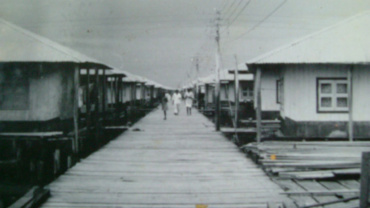At the centre of Ayetoro, beyond the wooden homes on stilts and the bridges over water, stood a building that carried more weight than its timber walls suggested: the Community Hall. Unlike the Power House that gave light or the canals that gave passage, the Hall gave voice. It was here that the Apostles and elders gathered, where decisions shaping the life of the Happy City were made, and where the ideals of justice and unity were translated into action.
From its earliest days, Ayetoro was built on the principle of collective governance. No single man or woman held absolute authority. The Ogeloyinbo served as spiritual leader, but matters of daily life — from fishing quotas to land disputes, education to market rules — were discussed and resolved in council. The Community Hall was their forum. Oral testimonies describe it as a simple but sturdy wooden structure, with benches arranged in a circle to remind all present that decisions were made not from the top down, but from within the community itself.
Archival photographs show rows of white-garbed Apostles seated shoulder to shoulder, their heads bowed in prayer before debate began. Once the opening hymns were sung, the elders took turns speaking. Voices carried through the open windows, across the water, reminding everyone outside that Ayetoro belonged to all and that transparency was not just an idea but a practice.
It was here, in 1959, that the bold decision to build the Power House was agreed upon, a choice that marked Ayetoro as a beacon of self-reliance. It was here that disputes between neighbours were settled, not with punishment but with reconciliation. And it was here that young men and women were invited to listen, to learn the rhythms of leadership, and to understand that power was a responsibility to be shared.
The Community Hall was more than a place for governance. It was a stage for community theatre, a classroom for evening lessons, and a shelter during storms. Children recall sitting on the floor as teachers sketched letters on wooden boards. Fishermen remember rushing in during sudden rains, sharing laughter as they dried themselves by lantern light. Mothers used the space to organise cooperatives, pooling resources to strengthen their families and trade.

Visitors who came in the 1960s often remarked that the Hall gave Ayetoro its distinctive character. While other towns depended on chiefs or colonial administrators, Ayetoro’s fate was decided in open assembly. To many, it was living proof that democracy, rooted in spiritual values and communal trust, could thrive on African soil long before it became a national slogan.
Today, the original Community Hall has been lost to the encroaching sea, but its legacy lives on. Elders still recall the sound of hymns rising before debate, the clatter of benches as men and women took their seats, and the sense that within those walls, everyone had a place. As one resident once said: “The Hall was not just a building. It was the voice of Ayetoro.”




